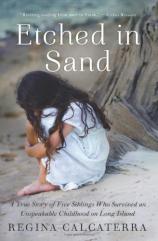Reading Group Guide
Discussion Questions
Etched in Sand

1. What was your perception of children on the fringe before reading ETCHED IN SAND? How has it changed? Do you think we, as a society, have the responsibility to reform the welfare system that looks out for them?
2. How does Calcaterra present the dynamic between her siblings and their mother? How does that dynamic shift throughout the book?
3. Are the harrowing stories of abuse and poverty that Regina grew up with in Etched in Sand accessible? How so?
4. “‘I’ll get you back!’ she’s screaming through the car window, but not because she’s lost what matters most to her. It’s because she’s lost her meal ticket.”
Regina’s first criticism on the welfare system is wondering how the government can keep giving her mother cash without ever checking where she spends it. How does this tie into Regina’s decision to dedicate her life to public policy?
5. How does the author present the social workers, foster parents, and teachers trying to "help" kids like Regina? Is she critical of them? Why can't they help a child living on the fringe, like her?
6. Do we feel sorry for Regina and her siblings? Why?
7. What is Regina’s relationship with religion? Is it significant that she does not believe in a god who would allow such terrible things to happen to children, yet collects Jesus figurines for comfort?
8. What roll does literature play in Regina's life? What about the women she idolizes, like Amelia Earheart? How do these strong women highlight the persistence in Regina’s personality that lets her become so successful in light of the desolate childhood that she had?
9. “Norman and Rosie have always been ‘the kids,’ because they’re ‘the kids’ to our mother. She’ll say, ‘Who’s taking care of the kids?’ and I know she means Norman and Rosie. I have never been a kid.” Considering the adult way that Regina takes responsibility over her younger siblings and the rare but rich moments they enjoyed when they were safe together, did Regina have a childhood? Did any of her siblings? How does this end up tying into the difficulty they have reuniting with Rosie years later?
10. Did Etched in Sand change your idea of childhood, and of family? Did it make you realize something that you perhaps took for granted?
11. What is being a "mother" in Regina's eyes? Is she a mother? Is Cookie?
12. "To me, being a foster kid is a little bit like being a dog." What is the author's attitude towards foster care? Do you think her portrayal is fair, given the fact that she included the first foster family she lived with, who actually treated her quite well?
13. Regina was incredibly quiet in school when she was young. How did she go from "sending signals to others to keep away from [her] so they never find out the truth about [her] life" to publishing a memoir about her entire story?
Etched in Sand
- Publication Date: August 6, 2013
- Paperback: 320 pages
- Publisher: William Morrow Paperbacks
- ISBN-10: 0062218832
- ISBN-13: 9780062218834








